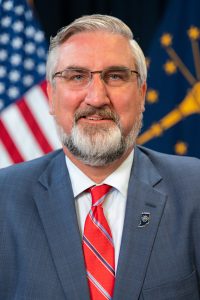Subscriber Benefit
As a subscriber you can listen to articles at work, in the car, or while you work out. Subscribe NowIndiana Gov. Eric Holcomb on Wednesday defended his signing of a near-total abortion ban this month and brushed off fears of business and talent attraction consequences in the wake of statements from major homegrown employers.

“I have yet to hear — and maybe we never will — some (companies) might just fly over the state of Indiana because of this issue,” Holcomb told reporters. “I don’t mean to act like it’ll never happen — it might. But so are a lot of other issues that factor into where someone invests.”
Holcomb spoke after a Q&A session hosted by the OneZone Chamber of Commerce, which serves Carmel and Fishers.
Asked if he believed Senate Enrolled Act 1 matched up with what the majority of Hoosiers want, Holcomb acknowledged deep divisions within the state.
“I believe it was progress. Some people believe it was the opposite of progress. Some people believe that it was not enough progress,” Holcomb said. “And I respect that, honestly. But I would just encourage folks to be very respectful.”
Progress toward what? Holcomb said “progress” didn’t mean he’d wanted to ditch the ban’s narrow exceptions for rape and incest, like some fellow Republicans.
“No, it means that we made progress. And it met my threshold of progress,” he said. “We’ll take the next hypothetical in the months and years ahead … This will far outlive my tenure.”
Holcomb was optimistic about the state’s competitiveness, despite warnings from pharmaceutical giant Eli Lilly and Co. and engine manufacturer Cummins Inc., released after the bill’s passage into law.
In an Aug. 6 statement, Lilly indicated the ban would affect its talent seeking and keeping efforts, adding, “Given this new law, we will be forced to plan for more employment growth outside our home state.”
The company has said it will honor its $2.1 billion Boone County commitment. CEO Dave Ricks made waves in April when he told a lunch crowd at the Indiana Convention Center that Indiana’s low taxes and regulatory burden aren’t enough to be competitive.
“We are deeply concerned about how this law impacts our people and impedes our ability to attract and retain a diverse workforce in Indiana,” Cummins spokesman Jon Mills said in an Aug. 6 statement bluntly opposing the ban.
Holcomb didn’t share those reservations.
“It is full steam ahead in every business ranking,” he told reporters. “It’s because of site selection superiority. It’s because of (the) low cost of doing business. It’s because of access to talent. And we have that access to talent — we had it yesterday, we have it today and we’ll have it tomorrow.”
Later, he said, “I’ll continue to work very closely with Lilly and I love the position that Dave Ricks has got that company in — and that it’s headquartered here. It’s a source of pride.”
The Indiana Capital Chronicle is an independent, not-for-profit news organization that covers state government, policy and elections.
Please enable JavaScript to view this content.
